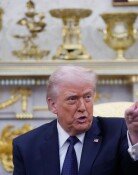2 pres. candidates must guard fiscal health
2 pres. candidates must guard fiscal health
Posted November. 29, 2012 04:45,
Solid state finance was the biggest contributor to Koreas faster-than-expected recovery from the Asian financial crisis in 1997. Back then, the country was on the verge of national bankruptcy due to a severe dollar shortage caused by the accumulated current-account deficit and flight of foreign capital. Yet Korea boasted a solid strong state finance. The government bailed the country out by borrowing dollars from the International Monetary Fund and expanded state spending to shore up the economy and invest in social safety nets. This was possible because the country had strengthened state coffers while achieving annual economic growth of 7-8 percent.
After the financial crisis, the national debt increased from 11.9 percent of GDP to 33.3 percent in the 15 years spanning the Kim Dae-jung, Roh Moo-hyun and Lee Myung-bak administrations. Koreas fiscal situation is still in better shape than advanced economies, but government finances hardly have a bright future considering rising demand for welfare programs due to the rapidly aging population and falling tax revenue in the wake of the era of low economic growth. The Korea Institute of Public Finance predicts that by 2050, the national debt rate will soar to 128 percent, a level comparable to that of Southern European countries facing a fiscal crisis, due to Korea`s aging population alone. Korea should also prepare for the possibility that the debts of state-run companies worth 361 trillion won (330 billion dollars), coupled with massive household loans larger in volume than those of advanced economies and corporate debts, which can be turned into national debt. Korean reunification will also be a daunting task that will require hundreds of billions of dollars.
Ruling Saenuri Party presidential candidate Park Geun-hye said she will pump 134 trillion won (123 billion dollars) to implement her election pledges over the next five years, including welfare programs. Her main rival, Democratic United Party candidate Moon Jae-in, has yet to present specific figures, but the funds required for the pledges the party made for the April 11 general elections alone reach 174 trillion won (160 billion dollars). The candidates say they will raise the funds through restructuring of government expenditures, including cuts in the budget and expansion of the tax base. But their promises are hardly trustworthy considering the situation at the National Assembly, which has continued the outdated practice of pork barrel memo budget," or extra budget demanded by lawmakers to serve the interests of their constituencies. Both Park, the conservative camp`s champion, and Moon, who was presidential chief of staff for the Roh Moo-hyun administration, should have a sense of responsibility for government debts that snowballed following the Asian financial crisis.
The government cannot single out all sloppy projects by closely examining the state budget that exceeds 300 trillion won (276 billion dollars) over four to five months by mobilizing insufficient staff. If politicians recklessly submit bills on tax-wasting projects to help interest groups and memo budget items, the country`s fiscal health will disappear instantly. If Korea is to preemptively prevent populist politics, it needs an institutional apparatus to prevent lack of transparency in government budget and wasteful government spending. Reform of the national budget will incite strong resistance from privileged forces. The Sound Government Finance Forum, comprising more than 100 retired civil servants from economic ministries and academics, has urged the country to reform politics first and re-examine budgetary spending from square one. The two presidential candidates must pay attention to voices warning of deteriorating government finances.







